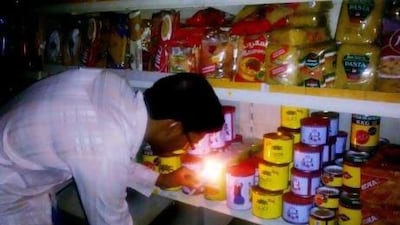DUBAI //Recent power cuts in Sharjah have residents worried they may be in for another summer of long periods without air conditioning, as was the case in 2009 and 2010.
The power went out about 6.30pm on Tuesday in some parts of Rolla, near Al Manama supermarket, and last week, areas around Al Mina were hit.
"There was no power in the area near the animal souq," said Prakash, who works at a supermarket in the area.
"Owners shut their business and went home. It was restored only after one and half hours."
On Wednesday last week, the power went out between midnight and 1am, and last Saturday it was out between 4pm and 5pm.
"It's happened twice in less than a week," said Mohammed Muneer, a resident who lives behind the animal souq. "We are worried about whether it will continue throughout the summer. The heat is unbearable."
Some shopowners in the area operated by candlelight, while others pulled down their shutters and went outside to escape the heat.
Mr Muneer said he left his flat during Wednesday's power cut and went downstairs with his daughter and wife.
"You cannot sit inside a home without AC," he said. "It's too hot these days We are praying that it will not happen again."
Siraj VP, also a resident of the area, said he had tried to contact the Sharjah Electricity and Water Authority (Sewa) at the time of the cut and had been told it was caused by a cable problem.
"Thank God, the problem did not continue for a long time," he said. "It's getting hotter and there should not be any more blackouts."
When approached for comment, a spokesman for Sewa said the authority had received no major reports of power disruption so far this summer.
"If there has been any problem it could be due to breakdown of a cable network," the spokesman said.
That is of little comfort to residents who recall the power cuts of 2010, which occurred at the height of summer and sometimes lasted all day.
At the time, they took to malls to escape the heat, and slept in their cars and on pavements.
Authorities say those who are nervous should keep in mind the Dh6 billion pledge made last March by Sheikh Khalifa, the President, to help solve power and water supply problems in the Northern Emirates.
"Government is trying to improve the situation," said Hussain Al Mahmoudi, the director general of Sharjah Chamber of Commerce and Industry.
"It is working with the federal Government to see that the power supply is not disrupted."
Mr Al Mahmoudi said the number of complaints over power supply had been decreasing.
"We anticipate even fewer problems this year," he said. "By 2017 things will be much better because of the launch of nuclear power stations.
"The problem is not restricted to Sharjah alone, but the entire GCC region is grappling with a shortage of power.
"We must remember that UAE is growing and there is a pressure on the infrastructure. But the Government is working on it."
Lalu Samuel, chairman of the Industry Business Group in Sharjah, agreed the Government was doing its best to resolve the power problem.
Mr Samuel said business owners should look on the bright side, as power is heavily subsidised in Sharjah, making it one of the least expensive places to do business.
"The authority is charging only 40 fils per unit," he said.
"This rate is much cheaper compared to places like India."


